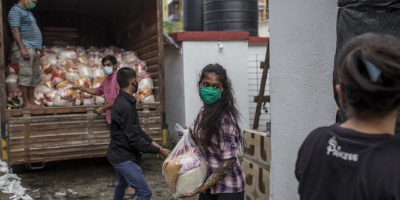The Social Science in Humanitarian Action Platform (SSHAP) is launching the next phase of its Fellowship Programme to begin in February 2024. Funded by the UK Foreign, Commonwealth and Development Office and the Wellcome Trust, SSHAP is looking for future leaders in social science to be able apply their knowledge to humanitarian emergencies in a locally relevant way.
At its core, SSHAP’s vision is to encourage emergency responses which are effective, adaptive, contextually informed and based on social and interdisciplinary science and evidence. The Fellows play a vital role in realising SSHAP’s vision. Throughout the duration of the Fellowship, the programme will pair social scientists with practitioners in the same region to facilitate and encourage interdisciplinary collaboration and knowledge exchange.
The Fellows will also have the benefit of working closely with leading thinkers and practitioners from within the SSHAP partnership between the Institute of Development Studies, Anthrologica, Gulu University, Le Groupe D’etudes Sur Les Conflits Et La Sécurité Humaine (GEC-SH), London School of Hygiene and Tropical Medicine, University of Juba, CRCF Senegal, University of Ibadan and the Sierra Leone Urban Research Centre.
The Fellowship will include:
- Weekly mentoring with a SSHAP expert
- Tailored professional training programme (including network mapping and communications skills)
- Opportunities to learn from peers and share experiences
- Forums to shape discourse and dialogue
- Support in developing an operational briefing to be published and promoted via SSHAP channels
Each social scientist will be paired with a relevant practitioner to undertake the Fellowship together. Please note that all stages of this Fellowship – including the final workshop – will be held online in Arabic.
Eligibility
We welcome submissions from skilled and committed social scientists and practitioners in the field to take up this opportunity and contribute to the growing network.
To be eligible for the Fellowship you must:
- Be fluent in speaking, reading and writing Arabic.
- Be a national of and currently living in a lower- or middle-income country.
- Be either 1) a social scientist with research experience or 2) a public health or humanitarian response practitioner in a position to influence design and/or rollout of humanitarian activities.
What do we mean by a social scientist and practitioner?
- Social scientist: you are a social scientist with a deep understanding of your countries’ social and political context. You are well networked; you are in touch and have collaborated with other social scientists in your geographical region. You have the capacity to map the social science capacity of your region, as you know who the key players are. With the skills developed in this Fellowship you will be able to make your social science research useful for humanitarian action.
- Humanitarian practitioner: you are an experienced humanitarian practitioner (working for a local or international NGO, UN Agency, or other humanitarian agency) and you are responsible in planning humanitarian activities or carrying out surveys and other forms of research to influence activities. You are well networked: you are part of regional humanitarian networks, and you know who the key players in your geographical region are. With the skills developed in this Fellowship you will learn how to best use social science to redesign activities and research.
We will also ask all applicants to provide one referee.
Dates and duration
- 19th February – 29th April 2024 (approximately one day per week over 10 weeks)
Honorarium
Each Fellow will receive an honorarium of £1,000.
To apply
This call for applications is now closed. Deadline for applications was 7th January 2024 17:00 UTC.
Applicants will be informed of the result of their applications by email by the end of January.
SSHAP is committed to embedding and supporting equality, diversity, and inclusion in our work and in all our activities. We welcome applications from people of all backgrounds, beliefs, identities, orientations, and abilities.



